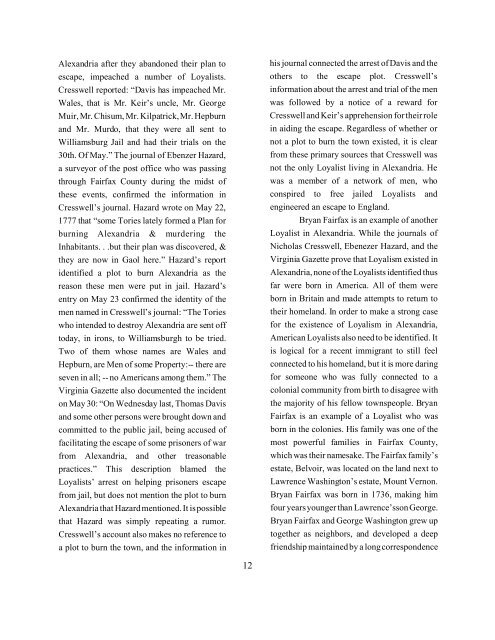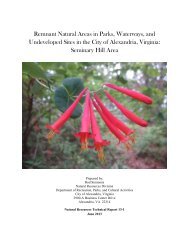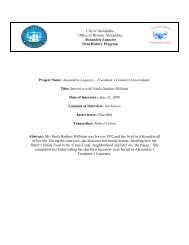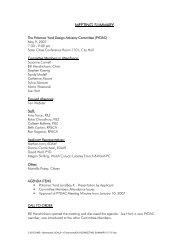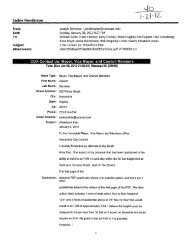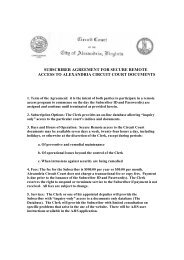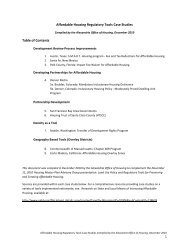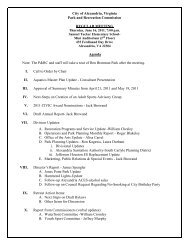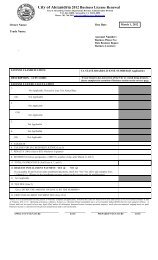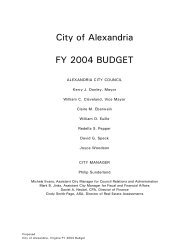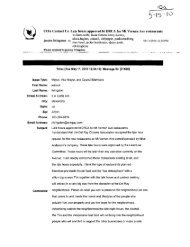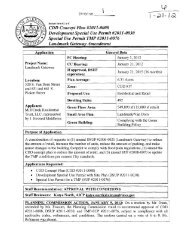LOYALISM IN EIGHTEENTH CENTURY ... - City of Alexandria
LOYALISM IN EIGHTEENTH CENTURY ... - City of Alexandria
LOYALISM IN EIGHTEENTH CENTURY ... - City of Alexandria
Create successful ePaper yourself
Turn your PDF publications into a flip-book with our unique Google optimized e-Paper software.
<strong>Alexandria</strong> after they abandoned their plan to<br />
escape, impeached a number <strong>of</strong> Loyalists.<br />
Cresswell reported: “Davis has impeached Mr.<br />
Wales, that is Mr. Keir’s uncle, Mr. George<br />
Muir, Mr. Chisum, Mr. Kilpatrick, Mr. Hepburn<br />
and Mr. Murdo, that they were all sent to<br />
Williamsburg Jail and had their trials on the<br />
30th. Of May.” The journal <strong>of</strong> Ebenzer Hazard,<br />
a surveyor <strong>of</strong> the post <strong>of</strong>fice who was passing<br />
through Fairfax County during the midst <strong>of</strong><br />
these events, confirmed the information in<br />
Cresswell’s journal. Hazard wrote on May 22,<br />
1777 that “some Tories lately formed a Plan for<br />
burning <strong>Alexandria</strong> & murdering the<br />
Inhabitants. . .but their plan was discovered, &<br />
they are now in Gaol here.” Hazard’s report<br />
identified a plot to burn <strong>Alexandria</strong> as the<br />
reason these men were put in jail. Hazard’s<br />
entry on May 23 confirmed the identity <strong>of</strong> the<br />
men named in Cresswell’s journal: “The Tories<br />
who intended to destroy <strong>Alexandria</strong> are sent <strong>of</strong>f<br />
today, in irons, to Williamsburgh to be tried.<br />
Two <strong>of</strong> them whose names are Wales and<br />
Hepburn, are Men <strong>of</strong> some Property:-- there are<br />
seven in all; -- no Americans among them.” The<br />
Virginia Gazette also documented the incident<br />
on May 30: “On Wednesday last, Thomas Davis<br />
and some other persons were brought down and<br />
committed to the public jail, being accused <strong>of</strong><br />
facilitating the escape <strong>of</strong> some prisoners <strong>of</strong> war<br />
from <strong>Alexandria</strong>, and other treasonable<br />
practices.” This description blamed the<br />
Loyalists’ arrest on helping prisoners escape<br />
from jail, but does not mention the plot to burn<br />
<strong>Alexandria</strong> that Hazard mentioned. It is possible<br />
that Hazard was simply repeating a rumor.<br />
Cresswell’s account also makes no reference to<br />
a plot to burn the town, and the information in<br />
12<br />
his journal connected the arrest <strong>of</strong> Davis and the<br />
others to the escape plot. Cresswell’s<br />
information about the arrest and trial <strong>of</strong> the men<br />
was followed by a notice <strong>of</strong> a reward for<br />
Cresswell and Keir’s apprehension for their role<br />
in aiding the escape. Regardless <strong>of</strong> whether or<br />
not a plot to burn the town existed, it is clear<br />
from these primary sources that Cresswell was<br />
not the only Loyalist living in <strong>Alexandria</strong>. He<br />
was a member <strong>of</strong> a network <strong>of</strong> men, who<br />
conspired to free jailed Loyalists and<br />
engineered an escape to England.<br />
Bryan Fairfax is an example <strong>of</strong> another<br />
Loyalist in <strong>Alexandria</strong>. While the journals <strong>of</strong><br />
Nicholas Cresswell, Ebenezer Hazard, and the<br />
Virginia Gazette prove that Loyalism existed in<br />
<strong>Alexandria</strong>, none <strong>of</strong> the Loyalists identified thus<br />
far were born in America. All <strong>of</strong> them were<br />
born in Britain and made attempts to return to<br />
their homeland. In order to make a strong case<br />
for the existence <strong>of</strong> Loyalism in <strong>Alexandria</strong>,<br />
American Loyalists also need to be identified. It<br />
is logical for a recent immigrant to still feel<br />
connected to his homeland, but it is more daring<br />
for someone who was fully connected to a<br />
colonial community from birth to disagree with<br />
the majority <strong>of</strong> his fellow townspeople. Bryan<br />
Fairfax is an example <strong>of</strong> a Loyalist who was<br />
born in the colonies. His family was one <strong>of</strong> the<br />
most powerful families in Fairfax County,<br />
which was their namesake. The Fairfax family’s<br />
estate, Belvoir, was located on the land next to<br />
Lawrence Washington’s estate, Mount Vernon.<br />
Bryan Fairfax was born in 1736, making him<br />
four years younger than Lawrence’sson George.<br />
Bryan Fairfax and George Washington grew up<br />
together as neighbors, and developed a deep<br />
friendship maintained by a long correspondence


